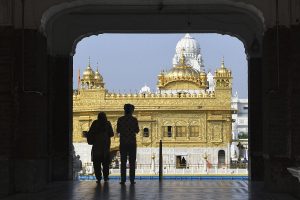With the Bengal Assembly election results emanating a pattern of strong resistance against the BJP, considered by many sections of the society as a “totalitarian power”, Chinmoy Guha, a recipient of Legion of Honour, a polyglot, and a professor of English says the works of the Indianborn British author, George Orwell has become relevant once again.
The thrust and parry of the electoral battle ended yesterday in a devastating loss of the saffron brigade which had sought to woo voters by playing the “Hindutva” card as an antidote to TMC’s “minority vote-bank politics”.
Advertisement
However, be it the recently staged drama Mephisto directed by Suman Mukhopadhyay in collaboration with a section of Tollywood thespians, or a majority of Bengali electorate, Bengal got a whiff of the threat from dictatorial tendencies that appeared to threaten the “secular fabric” of the state.
Guha points out that the works of Eric Arthur Blair, or famously known as George Orwell tends to evoke the conscience in us that advocates for freedom and liberty.
“Orwell was always relevant, be it during the incumbent regime or during the long stint of the Left rule in Bengal. This time indeed there was a clear message. Orwell’s work dealt with the selfish ambitions of man and presented strong opinions against the fascist rule, mainly against Communistruled Soviet Union. He was also critical of the Nazi regime in Germany. This time Bengal fought a heroic battle as after many years it fought on the basis of ideology despite some aspects of the state lying in the doldrums,” he opined.
He pointed out that once a French student asked him whether India has opted for an authoritarian rule. “Since we choose government through democratic elections, the situation is quite ironical. Orwell’s Animal Farmis one of the best possible works which is a psychological study of authoritarianism. Another example is 1984.”
It may be mentioned that Orwell’s work Homage to Cataloniadocuments the events of the Spanish Civil War in 1936 where his will to speak out against totalitarian powers took him to Spain to fight against the anti-Franco regime where General Francisco Franco sought to defeat the Republic with the aid of Hitler and Mussolini.
Guha further recalled how during the Mauritius Book Fair, authors from several countries were vocal against totalitarianism but a young Chinese author somehow appeared tensed and too wary, speaking in measured words. He felt the works of Franz Kafka like The Castle, Jean-Paul Sartre’s Road to Freedom, and Aldous Huxley’s Brave New World advocated for intellectual freedom and in turn, revealed the free-spirited nature of the authors.
Tracing the roots of Orwell’s anti-totalitarian stance that is said to have originated while he served in the colonial police in Burma, polemicist and eminent author, Christopher Hitchens, in Why Orwell Mattersremarks, “It was once written of George Orwell that by consorting with the unemployed and destitute of England, he went native in his own country”.
Hitchens reminds the expression ‘going native’ originated as a term of contempt for white men who cracked under pressure. The term “native” was a colonialist term. Orwell writes in Shooting an Elephant, “I had already made up my mind that imperialism was an evil thing…”











